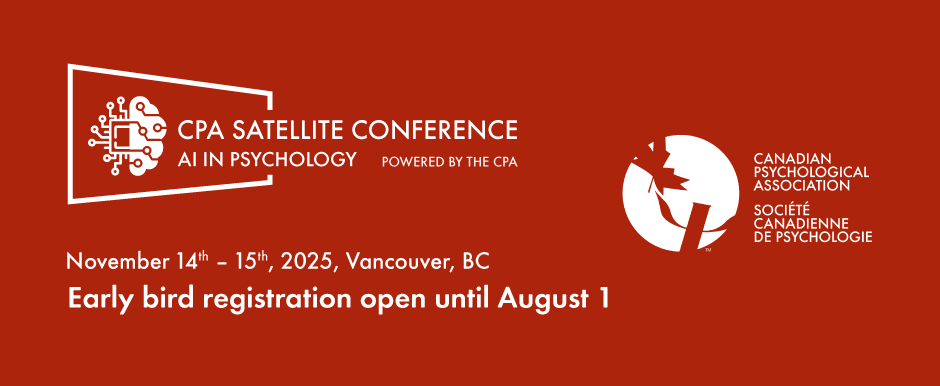
Every year, the CPA hosts an Annual Convention that brings together more than 1,200 members from across Canada to share and generate new ideas, network, and advance psychological science, practice, and education. Knowledge sharing and collaboration are essential to the evolution of psychology in Canada, and by creating more spaces for these conversations, we can continue to drive meaningful progress in the field.
As the needs of our membership grow and the landscape of psychology evolves, there is a need for a new, dedicated space to dive deeply into single, pressing topics. That’s why we’re launching the Annual CPA Satellite Conference—a yearly event focused on one issue that is important to our members. Each year, we will determine the topic of the conference based on what we and our membership feel is currently significant to psychology and deserving of in-depth and targeted discussion. These two-day events will bring together psychologists and students from across Canada to exchange ideas and insights, learning from the country’s leading psychology experts.
This year, our Satellite Conference will focus on Artificial Intelligence (AI) in Psychology. The AI landscape is rapidly evolving in Canada and beyond. What does this mean for psychological science, practice, and education in Canada? What can psychology teach us about how we use and interact with AI? What is psychology’s place in AI in Canada?
Don’t miss this opportunity to engage in critical discussions on AI’s role in psychological science, practice, and education. Join us in Vancouver at the stunning Nest at UBC for two days of insight, learning, and networking.
Plenary Speakers
Dr. Stéphane Bouchard

Title of Plenary: The Use of AI in Psychology and Its Impact on the Research Field
Description of Plenary: Applications of artificial intelligence (AI) in psychology arise from two broad types of AI: (a) discriminative AI, which could be used to improve the understanding of psychological processes and the detection, prevention, and treatment of mental disorders; and (b) generative AI, which enables rich interactions with computer programs, virtual people, and virtual psychologists. We will look at examples of exciting applications of AI that have been published in peer-reviewed journals. Researchers using discriminative AI need to consider implications for privacy, explainability, potential interactions with clinical characteristics or risk factors, and maintaining digital trust. The hype cycle of generative AI is at its peak, and it is important to understand how Large Language Models work and why they have been called ‘stochastic parrots’. The relevance of different tools for researchers in psychology will be illustrated, as well as research implications on accuracy, social bias, content modulation according to clinical disorders, addictions, social presence and anthropomorphism.
Dr. Rebecca Pillai Riddell

Title of Plenary: Embracing Technology in Mental Health: Pitfalls and Possibilities
Description of Plenary: Dr. Rebecca Pillai Riddell is the Nominated Principal Investigator for DIVERT Mental Health, a CIHR-funded Health Research Training Platform dedicated to supporting mental health researchers and clinicians at the juxtaposition of inclusivity, equity, and technology. Moving into the future as clinicians and researchers, there is a tension between efficiency and the human components upon which our professions are built. On one hand, technology promises a further reach than ever imagined possible. On the other hand, the struggles of upholding genuine human connections through digital and virtual interfaces. Dr. Pillai Riddell will discuss the pitfalls and possibilities of mental health from a technological and clinical perspective.
Dr. Brenda Stoesz

Title of Plenary: Empowering or Undermining? The Role of Generative Artificial Intelligence in Today’s Teaching and Learning Context
Description of Plenary: Generative artificial intelligence (GenAI) is influencing perspectives and practices across all levels of education—from K-12 to postsecondary studies. In her interactive plenary session, Dr. Brenda M. Stoesz will examine the strengths, limitations, and ethical considerations when implementing genAI into various teaching and learning contexts (e.g., classrooms, laboratories, and practica). She will share how these technologies can empower postsecondary educators to create interactive and personalized learning experiences for students, identify the connections between genAI use, learning, and academic integrity (or misconduct), and the examine the potential impact on traditional teaching and learning strategies. Drawing on her higher education research and practical teaching experience, Dr. Stoesz will provide insights into the effective integration of genAI in education to ensure that these technologies support rather than diminish educational quality.
